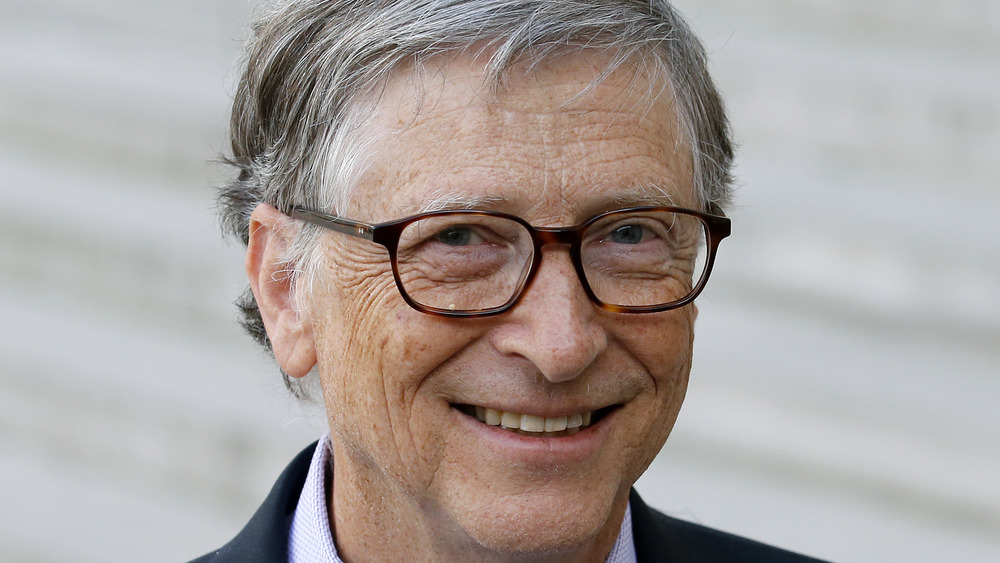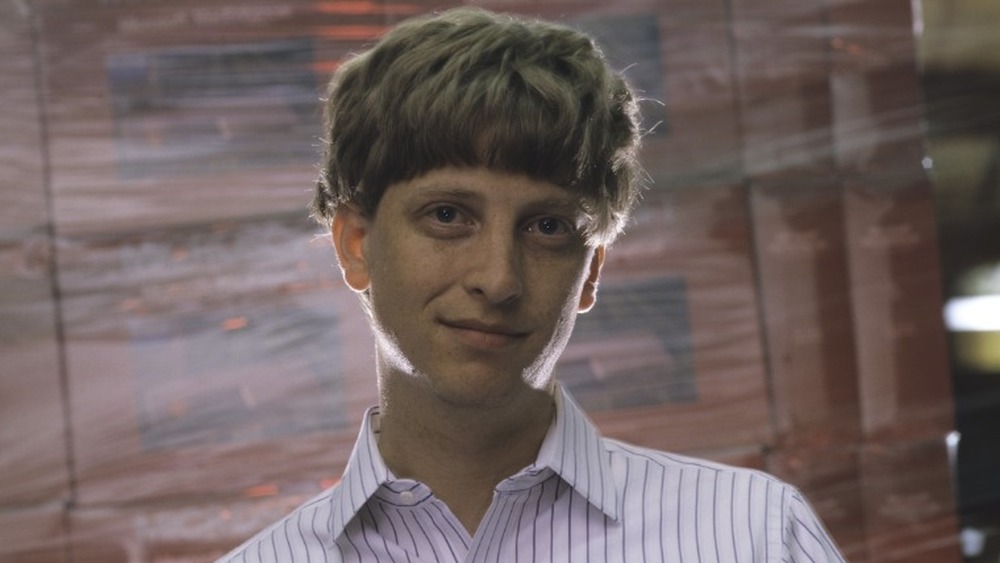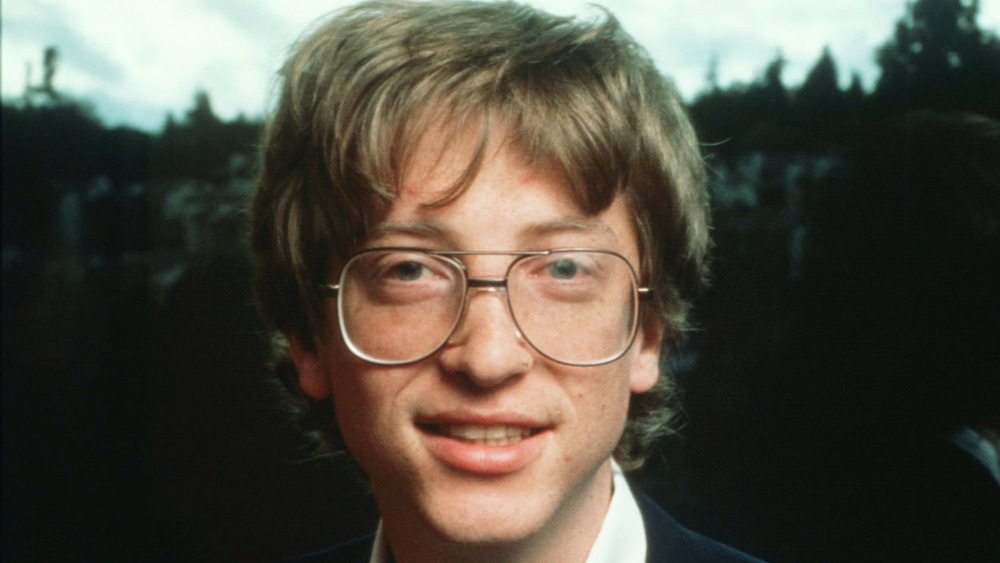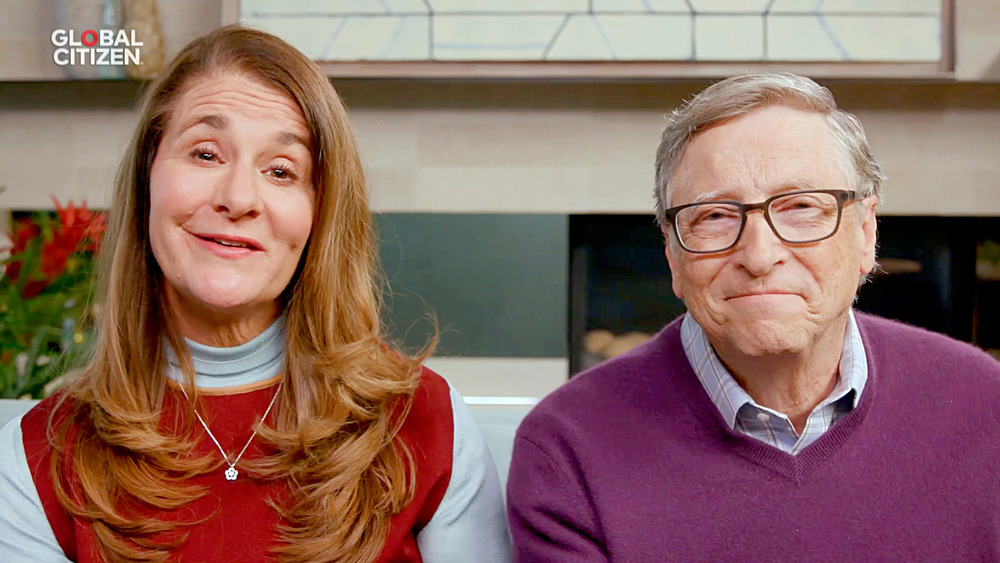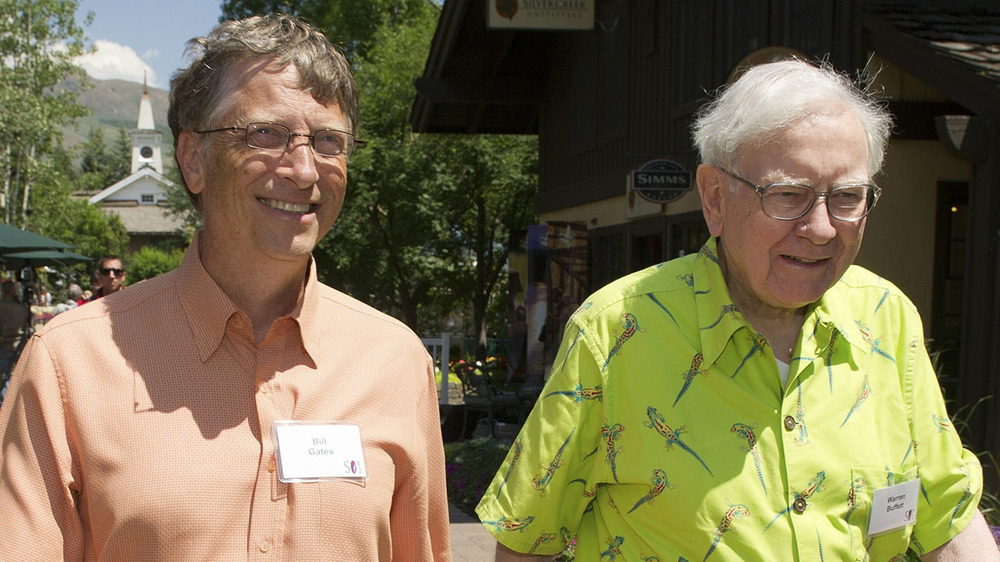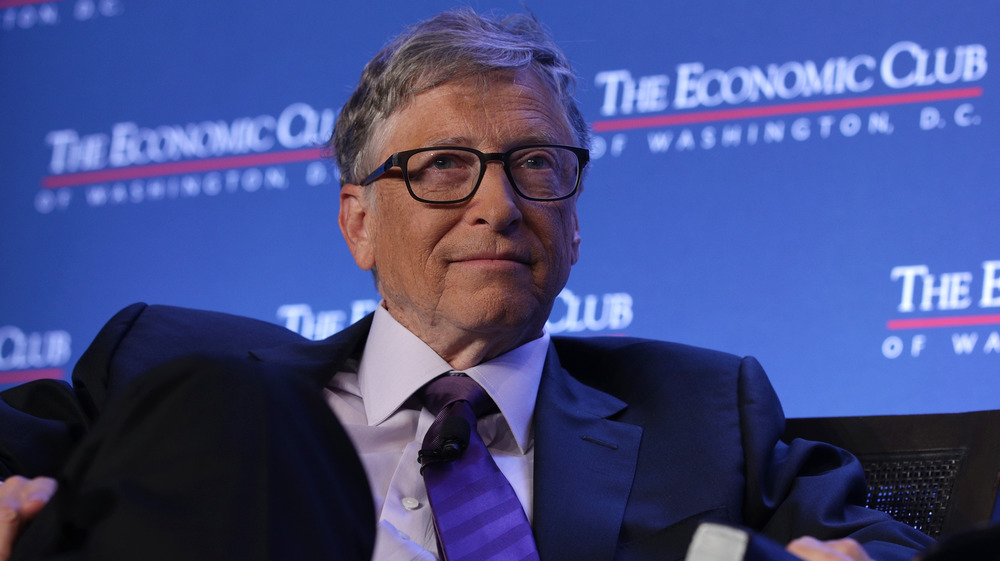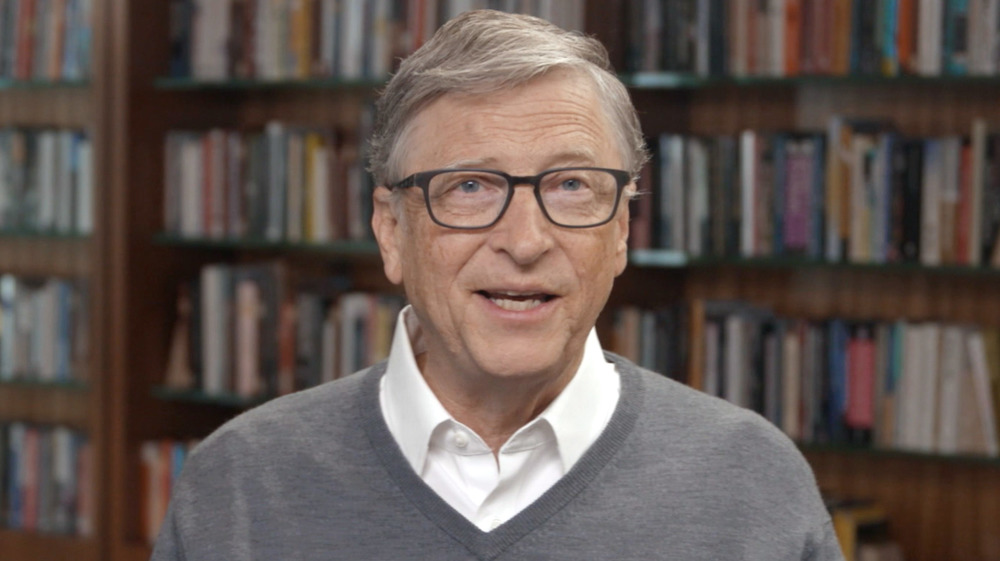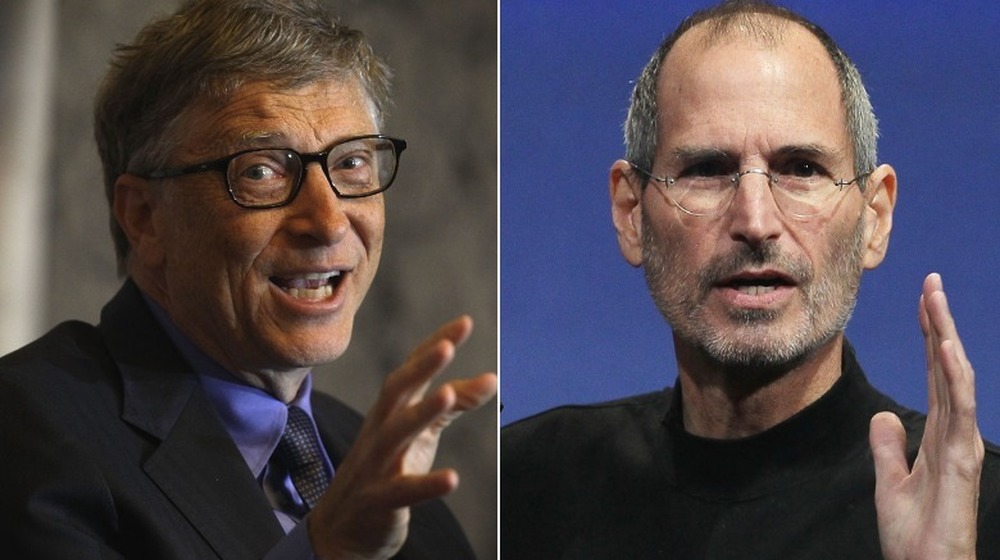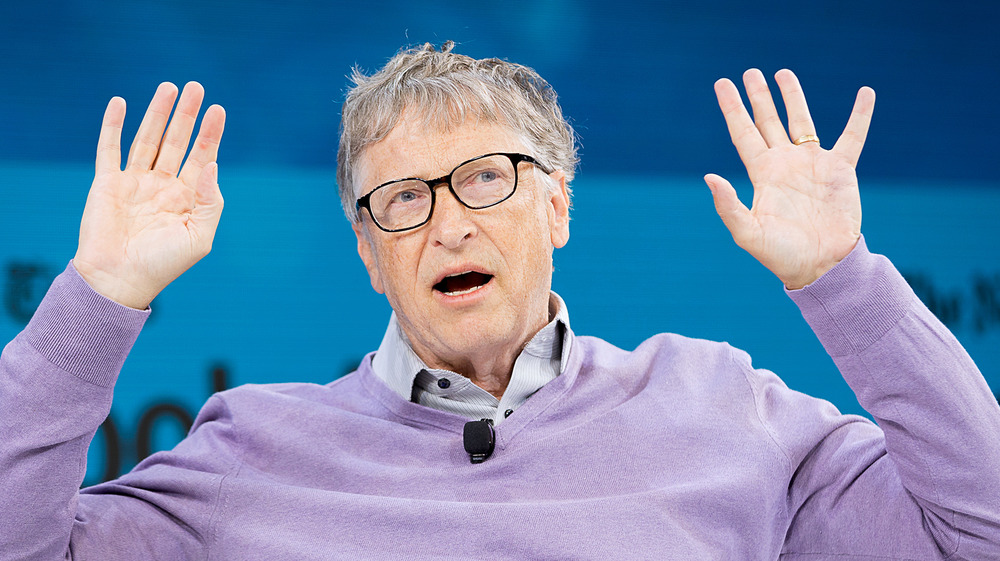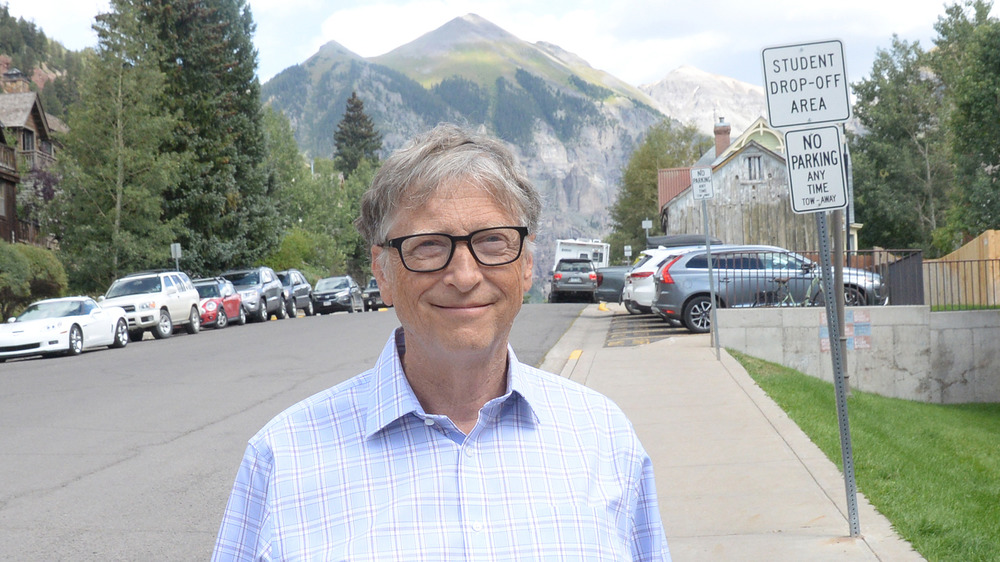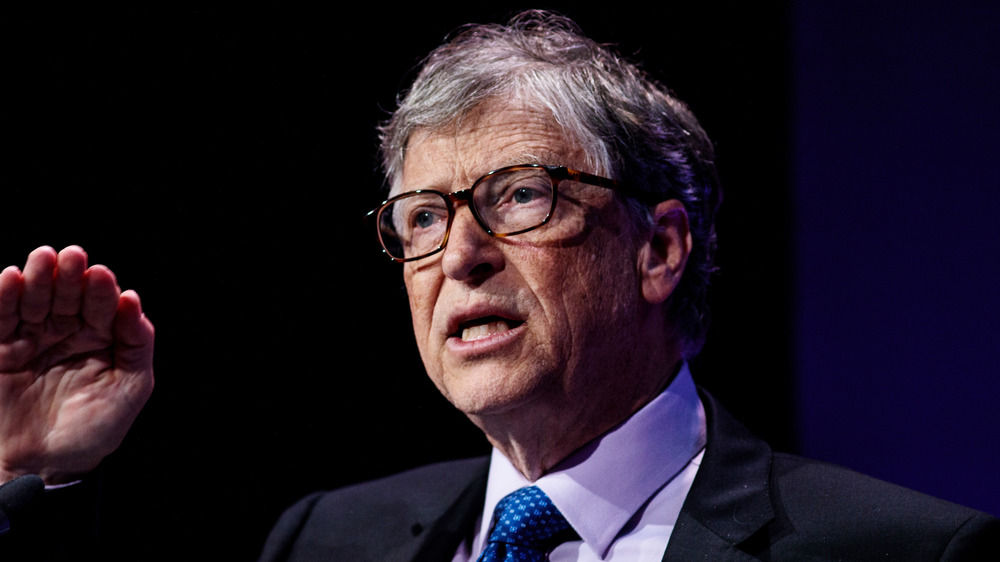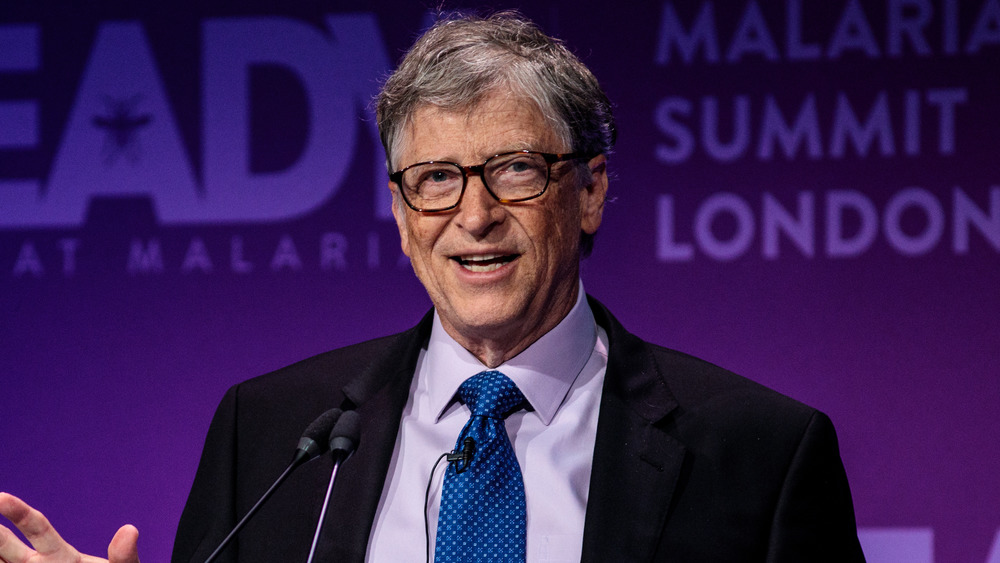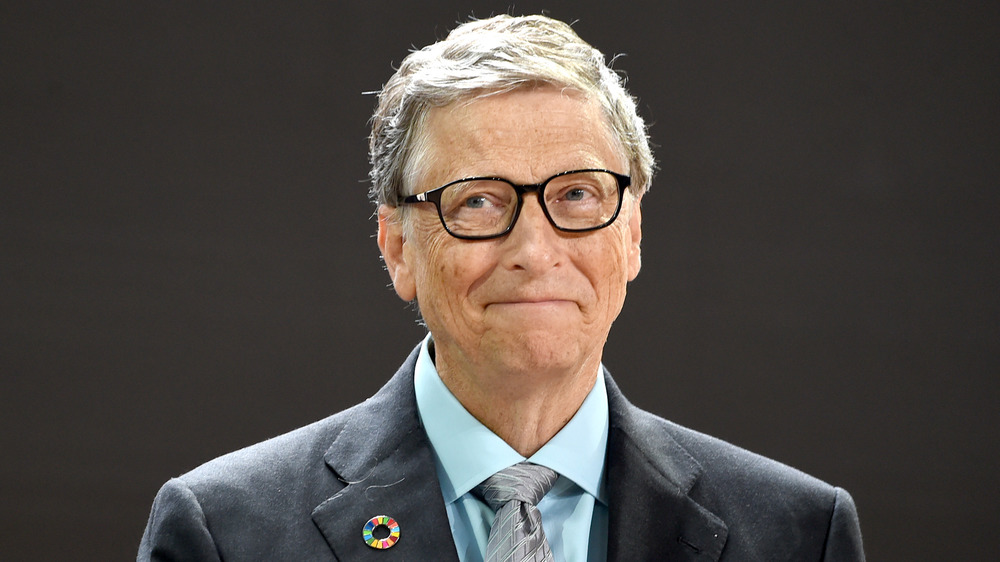What You May Not Know About Bill Gates
While some billionaires like to make a habit of inflating their net worth, Bill Gates is undeniably rich. He's also one of the original tech superstars, alongside Steve Jobs, who made their mark long before the newer class, like Twitter founder Jack Dorsey and Facebook's Mark Zuckerberg — men who also accrued huge fortunes. Not that it's all about money for Gates, who once said (via Forbes), "Money has no utility to me beyond a certain point. Its utility is entirely in building an organization and getting the resources out to the poorest in the world."
But as a well-known philanthropist and the co-founder of Microsoft, Gates has definitely achieved both of these goals, all while watching his tech idea turn into the biggest software company in the world as of 2021, per Investopedia. In fact, you might even be reading this article on Windows software. Even outside of tech, with all eyes on him, Gates is still finding ways to surprise. In 2020, for example, one of his older speeches unexpectedly earned a new life online — but more on all that below.
Here's what you may not know about Bill Gates.
Inside Microsoft's origin story
It's hard to imagine a time without a cell phone, let alone a computer. But in the '70s, many people still had no clue about the possibility of the technology. "Early on, Paul Allen and I set the goal of a computer on every desk and in every home," Gates wrote in a 2015 email to Microsoft employees (via CNN). His message marked the 40th anniversary of the company, which started on April 4, 1975, thanks to Gates and Allen, his friend and fellow co-founder.
"It was a bold idea and a lot of people thought we were out of our minds to imagine it was possible," Gates continued. While he and Allen clearly held an audacious vision of the future, it's hard to believe either knew of their incredible success to come. "It is amazing to think about how far computing has come since then, and we can all be proud of the role Microsoft played in that revolution," Gates concluded.
Back in 1974, the first personal computer — the Altair 8800 — became available to the public. Most other "computers were expensive and complicated," CNBC recalled. The two men relocated to Albuquerque, where the Altair 8800's parent company, MITS, resided. Their goal was to produce software for the machine, and the name, originally "Micro-Soft," stood for "microprocessors and software," according to History. By comparison, in 1976, Steve Jobs and Steve Wozniak introduced the Apple 1 computer, per CNBC.
Bill Gates helped code an early IBM PC video game
Techies and video games go hand-in-hand, so it's no surprise that Bill Gates eventually became involved in a gaming project. What's more surprising, however, was the timing. While Gates was busy building his Microsoft empire, the entrepreneur had a little fun as he and systems programmer Neil Konzen coded a video game that would appear on the first IBM PC in 1981, Donkey, according to Folklore. If you think the name is a bit weak, the gameplay is reportedly not that different.
In the game, the outlet reports, "The player was supposed to be driving a car down a slowly scrolling, poorly rendered 'road,' and could hit the spacebar to toggle the jerky motion." This also meant an infuriating retro beeping noise every time the car changed lanes. In videos of the game, one can see that a questionable-looking donkey randomly appears on either side of the road as the race car speeds up the screen. And if the player doesn't move quick enough? The car crashes. But, make it past enough donkeys, and earn a point. At the top of the game is a "Donkey" vs "Driver" count to see who is winning the game. Simpler times, indeed.
Still, as Gates reflected in 2001, "We wrote, late at night, a little application to show what the Basic built into the IBM PC could do. And so that was Donkey.bas. It was, at the time, very thrilling." Per CNBC, Donkey became available for download at Apple's App Store in 2020.
Who is Bill Gates' wife?
Bill Gates and his wife, Melinda Gates, first crossed paths in 1987 in New York. Melinda was a new employee at Microsoft, and she and Bill "sat next to each other at an Expo trade-fair dinner" on the business trip, according to The Telegraph. "He was funnier than I expected him to be," she remembered. The two reconnected in Seattle on the Microsoft campus, where, in the parking lot, Bill asked the Texas native out on a date.
They ultimately wed in Hawaii in 1994 and would later welcome three children, Jennifer, Phoebe, and Rory. But Melinda left Bill "stunned" when she stepped down from her role as Microsoft's general manager to stay home and raise their kids. In her 2019 book, The Moment of Lift, she revealed that she'd told him (via Business Insider), "If we want the values that we both believe in as a couple for the kids, somebody has to be home to instill those values." Noting that "Bill was incredibly supportive all along the way," she continued to work toward other endeavors, including philanthropy.
Melinda shared with The Telegraph what it's like to live with one of the busiest and wealthiest men in the world: "Well, there's the question of sorting out the calendar. We have so many things to do, and that's always a challenge." Noting that they have different sleep patterns, Bill confessed, "I'm a night person. If I have a good book, or I'm doing something on the computer, I have a tendency to stay up."
The truth about his friendship with mentor Warren Buffett
As Microsoft increased its world domination in software and technology, co-founder Bill Gates' life direction drastically changed in part to one man — Warren Buffett. The "Oracle of Omaha," as some like to call Buffett, is the CEO of Berkshire Hathaway. He's also one of the most well-respected voices in the financial world and a billionaire himself. Worlds collided when these two brilliant men first met in 1991 when Gates was in his 30s.
"If it wasn't for his mother, we probably wouldn't know each other," Buffett told Charlie Rose about Gates. The two geniuses clicked and became close friends. Buffett, who is 35 years older than Gates, became a mentor to the young tech star and helped shift Gates' focus away from just running Microsoft. Without the responsibilities as CEO, Gates could then focus on other ways to help the world. The "big thing," Buffett explained, that came out of their discussions was "The Giving Pledge." This pact of the ultrarich to donate most of their life savings to worthy causes started small, but grew into an international group.
Gates and Buffett remained friends and continued to support one another over the years. "We discuss business, economics, politics, world events, and of course philanthropy," Gates wrote in a blog post about his friend on Gates Notes. And in honor of Buffett's 90th birthday in 2020, Gates revealed, "One thing we discovered the first time we met is that we both love math and numbers."
A day in the life of a billionaire
If you think becoming a billionaire means days lounging on the beach without a care in the world, think again. Bill Gates may be one the richest people in the world, but he also may be one of the busiest. According to The Telegraph, "Gates's timetable is planned for him, in the style of the US president, on a minute-by-minute basis. Long days are carved into five-minute slices, with every meeting and handshake timed to the second."
For those lucky enough to dine with Gates, they might be expecting a Michelin star restaurant. Instead, Gates likes to stick with one of his favorite lunches — cheeseburgers that are often from McDonald's, according to the Gates Foundation's managing director, Joe Cerrell, who added, "I don't think Melinda lets him have them at home."
Gates revealed that he eventually learned a more effective form of time management from his pal, Warren Buffett. In their 2017 interview with Charlie Rose, Gates confessed of his personal calendar, "I had every minute packed. And I thought that was the only way you could do things." This was in contrast to Buffett's calendar, as Gates explained, "He is so careful about his time. He has days that there's nothing on it." Of the importance of "control[ling] your time," Gates said, "Sitting and thinking may be a much higher priority than a normal CEO ... It's not a proxy of your seriousness that you filled every minute in your schedule."
Bill Gates and his buddy from Harvard
While Bill Gates is famously friends with Warren Buffett, he's not the only billionaire with whom he likes to spend time. He's also close with another famous tech superstar, Facebook founder Mark Zuckerberg. The two share the same alma mater, Harvard. Even better, both men never actually graduated from the university. Gates and Zuckerberg left the prestigious school for the same reason — to build one of the biggest companies in the world.
In 2017, in anticipation of Zuckerberg delivering the Harvard commencement speech, the university released a video starring him and Gates together. This came exactly ten years after Gates delivered the commencement speech, and Zuckerberg revealed that he'd been in the audience watching. The former dropout asked Gates, "They know we didn't actually graduate, right?" The Microsoft co-founder replied about the honorary custom for speakers, "That is the best part, they actually give you a degree."
Gates eventually became a mentor to Zuckerberg "in business and philanthropy," according to The New Yorker, as well as in politics, especially when it came time for the social media mogul to "testify before Congress for the first time about Facebook's handling of user data" in March 2018. According to the outlet, he "encouraged Zuckerberg to be attentive to D.C." with Gates saying, "Get an office there — now. And Mark did, and he owes me."
Behind Bill Gates' rivalry with Steve Jobs
Everyone likes a healthy rivalry story — and tech is no different. Early on in the personal computer days, two of the biggest players were always in competition — Macintosh and Microsoft. These rivals continued battling for customers as both companies grew to dominate the tech scene. One of the most famous ad campaigns was the "Get a Mac" series by Apple. The campaign featured Justin Long as the personification of the younger, cooler Apple, who joked in ads about how the PC was for more boring, traditional computer tasks like spreadsheets.
Despite the directed ads toward Microsoft, Gates still admired his biggest rival — Apple's late co-founder, Steve Jobs. In a 2020 interview on the Armchair Expert podcast, Gates admitted to host Dax Shepard, "Jobs was a genius." Gates talked about how Jobs did some successful things as co-founder, but he made his biggest impact when returning to the company in the late '90s. In fact, Gates explained how Jobs was Apple's backup plan after an initial acquisition partner "asked for a little too much money," and that when Jobs returned, this kicked off an era of incredible success.
"So that period between when he goes back to Apple and when he sadly dies quite young, no one else can do what he did there," Gates claimed, before confessing, "I couldn't have done that. I don't know anyone who could have."
What does Bill Gates think about Bitcoin?
For years, Bitcoin was a mostly unknown premise with occasional appearances in the news. But as the digital currency picked up adaptors, its legitimacy as the "next big thing" in money became undeniable. And it only helps to have Bill Gates, a man made of money, talking about this alternative form of cash. As a tech mogul and businessman, Gates revealed to The New York Times in March 2021 that he'd been tracking the rise of Bitcoin, but remained skeptical of the currency. However, it's not for the reason you may think.
"Bitcoin uses more electricity per transaction than any other method known to mankind," Gates told the interviewer. This is counter to the trend of many companies aiming to "reduce their carbon footprints and exposure to fossil-fuel companies." That's why Gates claimed that Bitcoin is "not a great climate thing." But the billionaire is not completely closed off to the digital currency, explaining that if Bitcoin uses "green electricity and it's not crowding out other uses, eventually, you know, maybe that's OK."
The charitable side of Bill Gates
One of the greatest parts of Bill Gates' legacy will be not how he became a billionaire, but what he decided to do afterwards. In addition to running Microsoft, Bill and his wife, Melinda Gates, put their efforts toward helping make the world a better place. This culminated in the Bill and Melinda Gates Foundation, or BMGF. The charitable foundation is the "largest" in the world due to its "$40 billion trust endowment," according to Forbes. But the husband-and-wife team aren't the only ones who played a role in growing the foundation.
Bill's father, William, actually started the idea. "He first answered his son's request for help in using his resources to improve reproductive and child health in the developing world by directing the William H. Gates Foundation, which was established in 1994," per the Gates Foundation's website. This group then "merged with the Gates Learning Foundation to create the Bill and Melinda Gates Foundation in 2000." Bill's father remained as the co-chair of the foundation until his death in September 2020.
Using the reach and influence of the foundation, Bill has donated an incredible amount of money to charitable causes. According to an estimate by USA Today, as of 2020, the Microsoft co-founder had already given $50 billion over the course of 30 years.
What did Bill Gates buy in Washington?
No one should be shocked when Bill Gates buys something. And yet, he almost found a way to purchase something massive with few people knowing. In January 2021, The Land Report conducted some investigative journalism after learning that someone had picked up "a 14,500-acre swath of choice Eastern Washington farmland in the Horse Heaven Hills of Benton County." That much land cost a reported $171 million.
It turns out that the Microsoft mogul secretly purchased the property, which caused immediate speculation as to why. Was Gates planning to switch from tech to becoming a farmer? Indeed, this single purchase reportedly made Gates and his wife, Melinda "rank as America's largest private farmland owners."
With all this land, one proposed reason regarding the Gates' intentions has to do with the Bill and Melinda Gates Foundation, which spends a considerable amount of resources on sustainable development. Gates Ag One, for example, is a branch of the foundation that aims to ensure "high-quality, cutting-edge crop innovations are available and accessible to those that need them most" (via LinkedIn). It's possible, then, that this farmland would help continue the group's mission "to increase productivity and support food security as climate change, population growth, and gender inequality pose increasing threats."
The Microsoft co-founder made an eerie prediction
At the time, Bill Gates' 2015 TED Talk, "The next outbreak? We're not ready," seemed like so many other presentations on the platform. While some may have viewed the speech as purely entertainment and dismissed his theory on global pandemics as impossible, Gates continued to study the subject. In a 2016 interview with The Telegraph, Gates was noted as reading a book about bacteria. "I consider virtually all the trends to be positive. [But] there are three dark clouds that are always worth worrying about. One is a natural pandemic," he explained.
After the start of the COVID-19 pandemic, Gates' TED Talk recirculated and went, for lack of a better word, viral. "You predicted this would happen, and so I'm sure you're very prepared, because you knew this was going to happen," Ellen DeGeneres asked Gates on her talk show in 2020. As someone who outspokenly believed in the possibility of the pandemic, she asked Gates how he prepped for such a huge event. He said the "goal" of his TED talk "was so that the government would do the work to be ready for the next epidemic."
He also noted that he wrote an article for The New England Journal of Medicine to detail the dangers of a pandemic, and explained that if the government had accepted his theories, "That would have meant that we would have had diagnostics very quickly, drugs very quickly, even a vaccine, all of those things dramatically faster than what we're going through here."
How much is Bill Gates worth?
Yes, Bill Gates is a billionaire. But how many billions? After co-founding Microsoft in 1975, the company experienced an incredible growth. "By the end of 1978, Microsoft's sales topped more than $1 million," History recapped. The company relocated to Bellevue in Washington, "where Gates and Allen grew up," and in 1986, it went public. The following year, "31-year-old Gates became the world's youngest billionaire."
Based primarily off of Microsoft, but also including other business ventures, Gates accrued more and more every year, despite the fact that he "has sold or given away much of his stake in Microsoft — he owns just over 1% of shares — and invested in a mix of stocks and other assets," per Forbes. By March 2021, he was worth an estimated $126.2 billion. This made Gates the second richest person in the world, behind Amazon founder Jeff Bezos.
While Gates thoughtfully gifts away much of his money, he certainly picked up a few things for himself — none as spectacular as his 66,000-square-foot mansion in Medina, Wash., which was "nicknamed Xanadu 2.0 after the fictional estate in the movie, Citizen Kane," per Property Guru. The home looks over Lake Washington and "was valued at ... $147.5 million" in 2009. In addition to a movie theatre, reception hall, and "two secret pivoting bookcases, one of which hides a bar," Gates' home library shows off "the Codex Leicester; Leonardo da Vinci's 16th century notebook," which cost a reported $30.8 million.

